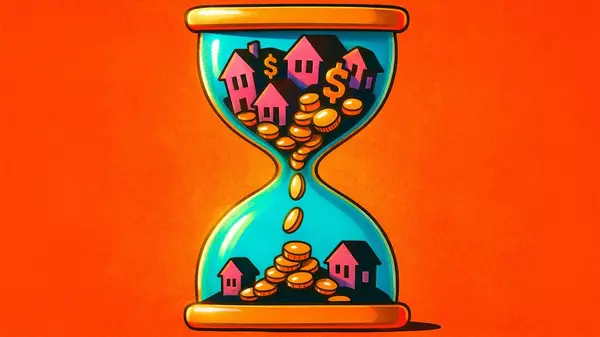Boomers Sit on $85 Trillion in Wealth, and Gen Z and Millennials Won’t Catch Up Anytime Soon

Baby boomers are officially the wealthiest generation, holding more than $85 trillion in assets, according to data from the Federal Reserve.
Baby boomers still hold over half of the nation's wealth, despite making up less than 20% of the U.S. population. Millennials and Gen Z, by contrast, make up 42% of the population but hold only around 10% of the country's wealth.
"When it comes to the nation's financial picture, older generations are way overrepresented and younger generations underrepresented," says Jake Krimmel, senior economist at Realtor.com®.
Krimmel points out that when baby boomers were much younger back in 1995, they still held around 30% of the nation's wealth and 40% of the nation's real estate assets.
"So it really is the case that boomers have been on top for their whole adult lives, leaving other generations behind and worse off," he adds.
Boomers and housing
According to Realtor.com research, baby boomers own an estimated $18 trillion to $19 trillion worth of real estate across the U.S.
"Baby boomers became the richest generation because they got a once-in-a-lifetime setup," says CPA and attorney Chad D. Cummings of Cummings & Cummings Law. "They bought homes when an ordinary salary could cover the mortgage on a modest house without turning every month into a financial siege. They locked those mortgages in, then watched home prices surge and interest rates collapse."
Krimmel agrees that the boomers' gains—and their staying power—is absolutely the result of decades of homeownership and rising property values. "They've been able to realize the benefits of homeownership for decades, from low and stable monthly payments, to forced savings, to building equity and trading up the housing ladder," he says.
Despite owning more than 40% of housing assets, most boomers have no intention of moving anytime soon, adding yet another pressure point for younger generations.
"Boomers' decision to age in place, combined with pandemic-era mortgage rates that discourage selling, has created a significant bottleneck," says Aaron Buchbinder, broker associate at Compass in Boca Raton, FL. "Many older homeowners are reluctant to give up low property taxes or sub-3% mortgage rates, so they’re staying put rather than downsizing. This limits supply for younger buyers, pushes prices even higher, and has contributed to the rising median age of first-time homebuyers."
But that’s just one aspect of boomers’ impact on the current housing squeeze.
"One critical thing boomers and older generations have also done is pull up the housing ladder behind themselves by adopting NIMBY tendencies over the last several decades," says Krimmel. "They've built their wealth in part on housing and then supported policies making it more difficult to build new housing. In short, they've helped to create the housing shortage that has both made their own properties more valuable and shut younger generations out of homeownership and wealth-building."
Boomers and stocks
NYU professor Edward Wolff notes in a National Bureau of Economic Research paper that many boomers began investing in stocks well before prices surged, providing a substantial leg up.
"Because the cost of shelter and health care were much lower in the 1980s and '90s compared with today, when baby boomers were in their prime earning years, they found it easier to save and invest than today's younger generations," explains Krimmel.
Cummings concurs. "They bought cheap, held forever, and rode 40 years of expansion that younger workers now have to buy into at peak prices," he says.
By comparison, the odds seem stacked against the younger generations.
"Younger generations live in an ethos that grinds them down before they ever get to invest," says Cummings, who is a millennial himself. "A millennial who graduates owing six figures, pays child care that looks like a second rent payment, and carries health insurance premiums that swallow what used to be a mortgage payment never gets the breathing room boomers had."
Additional boomer advantages
There were other financial factors that played to boomers’ advantage as well—including the fact they paid much less for health care and higher education in the past.
"Boomers did not just pay lower tuition and medical bills—they paid amounts that almost feel fictional today," says Cummings.
Pensions are yet another perk that most younger generations won’t have access to.
"For boomers, employers handed out defined benefit pensions that guaranteed income for life," says Cummings. "Younger workers get none of that."
An uphill battle for younger generations
Due to all these factors, many experts believe younger age groups will never attain the same degree of financial prosperity enjoyed by boomers.
"The real question is not whether younger generations can catch up. ... They can't," says Cummings. "It's not going to happen without a serious, sustained period of economic deflation."
Many younger people are banking on inheritances from their baby boomer parents or grandparents, who are slated to pass on $90 trillion in the Great Wealth Transfer.
But a Charles Schwab report from early 2025 revealed that 45% of boomers said they would rather “enjoy my money for myself while I’m still alive,” while only 34% intended to preserve their wealth for the next generation.
Categories
Recent Posts










"My job is to find and attract mastery-based agents to the office, protect the culture, and make sure everyone is happy! "
